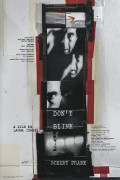
Directed by
Laura Israel
82 minutes
Rated M
Reviewed by
Chris Thompson

Don't Blink - Robert Frank
Synopsis: In a career spanning more than sixty years, Robert Frank revolutionised photography and independent film. Emigrating from Switzerland in the 1940’s he shares his time between New York City and Nova Scotia and, over the years has documented the Beat Generation, Welsh coal miners, Peruvian Indians, The Rolling Stones, London bankers and, in his landmark book The Americans, the myriad faces of ordinary citizens. Father to a daughter, Andrea, and a son, Pablo, both of whom died tragically young, Frank can be a difficult (almost impossible) interview subject; a rejecter of wealth and celebrity; a man whose ‘sympathies were with people who struggled,’ who has a ‘mistrust of people who made the rules.’ At the age of 91, Frank still produces books of his photography and independent videos.
I must admit to not having known much about the work of Robert Frank and, for me at least, one of the pleasures of this documentary was discovering his extensive catalogue of work as well as being introduced to the man behind the lens. Whilst there are ample opportunities for us to hear from the man himself and, of course, from others who’ve known and worked with him, it’s his imagery, both still and moving, that has the most the say about his view on the world and the film provides us with many, many examples of his provocative photographs along with clips from seventeen of his short, largely experimental films.
Frank, once described by Richard Linklater as “a restless, searching artist pushing the boundaries of the documentary, experimental, and more traditional narrative forms.”, is presented to us at different points in his life courtesy of a combination of archival interviews intercut with footage shot for this documentary at his windswept home at Mabou on the coast of Nova Scotia’s Cape Breton Island, at his gloriously cluttered apartment in Manhattan and generally on the streets of New York. What’s striking is the shift in demeanour over the years, especially between the clips of an ‘80s interview where Frank is confrontational and uncooperative (albeit in a good-humoured way) to the present-day scenes where he comes across as more mellowed and engaging as he sorts through the jumble of boxes and drawers full of photographs and postcards and handwritten notes and reminisces about his life and work which, for him, are clearly one and the same. The insights of the more recent interviews are no doubt due to the longstanding relationship he’s had with the director Laura Israel: she’s worked as his editor since the ‘80s. Still, despite the wisdom of old age he’s still a man of impulse and action and, at times, he simply overrides Israel’s direction and goes off on his own tangents. Wisely, she goes with him and the results are both informative and entertaining.
There’s so much of interest in Frank’s life: the unique marriage he shares with artist June Leaf ; his time with beat icons Alan Ginsberg and Jack Kerouac as captured in his first film, Pull My Daisy; his fascination with Julius Orlovsky the catatonic schizophrenic he filmed after his release from an asylum ; the controversy of his film, Cocksucker Blues (1972) made during the recording of The Rolling Stones ‘Exile on Main Street’ and withheld from release by Jagger; the battle to regain the rights to his seminal photographic collection The Americans ; and, of course, the deep sadness and philosophical questioning he carries after the tragic loss of his children.
Israel’s film touches on all of this with the backing of a killer soundtrack of songs by Tom Waits, Bob Dylan, The Rolling Stones, The Velvet Underground, Patti Smith and more. For me, the scale of Frank’s life and works deserves more than the scant 82 minutes devoted to him here and there were many times that I felt frustrated that we weren’t taken deeper into the story. But, as an entree to a great American visual artist, the film certainly did its job in whetting my appetite to seek out more. And to prove that point, you can find Pull My Daisy (1959) on Vimeo. It’s worth a look not just for Frank’s loose and improvisational film technique, but for Kerouac’s narration and Alan Ginsberg’s hilariously bad interpretative dance.

Want more about this film?


Want something different?




